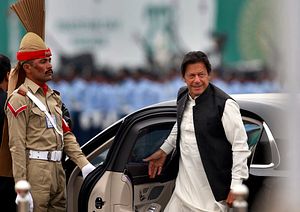Saudi Arabia and the United Arab Emirates sent their top diplomats to Pakistan on Wednesday to help Islamabad defuse tensions with India over the disputed Kashmir region.
Anti-India sentiment has grown in Pakistan since New Delhi moved to strip the Indian-administered portion of Kashmir of its limited autonomy on Aug. 5. Authorities imposed a sweeping military curfew that’s still in place, and cut off residents from all communication and the internet. Mobile phone services have yet to be restored.
Gulf Arab countries have kept mostly silent on the issue, underpinned by more than $100 billion in annual trade with India that makes it one of the Arabian Peninsula’s most prized economic partners.
In a rare move, a single aircraft carried the two Arab diplomats — Saudi Minister of State for Foreign Affairs Adel bin Ahmed Al Jubeir and UAE Foreign Minister Sheikh Abdullah bin Zayed Al Nahyan — to Islamabad in what Pakistani authorities said was a symbolic show of unity.
Minutes before the diplomats’ plane touched down, Pakistani army spokesman Maj. Gen. Asif Ghafoor said the military will “fight to the last bullet and the last soldier” if all peaceful options fail to resolve the Kashmir issue. He spoke at a press conference in the garrison city of Rawalpindi.
The two nuclear-armed neighbors have fought three wars — two of them over control of the region — since they won independence from the British in 1947.
The two diplomats held talks with Pakistani Prime Minister Imran Khan and Foreign Minister Shah Mahmood Qureshi. A statement released after the meetings said Saudi Arabia and the UAE “would remain engaged to help address the current challenges, defuse tensions, and promote an environment of peace and security.” Qureshi had said Tuesday that the diplomatic visit followed direct appeals from Khan.
They were also set to meet with country’s army chief, Gen. Qamar Javed Bajwa.
Kashmir is divided between India and Pakistan, and is claimed by both. The Himalayan region is India’s only Muslim-majority state and most people there oppose Indian rule. A United Nations Security Council resolution promised a U.N.-sponsored referendum on Kashmir’s “final disposition” that has never been held.
Indian Prime Minister Narendra Modi has defended the Kashmir changes as freeing the territory from separatism, and his supporters have welcomed the move.
India accuses Pakistan of training and arming insurgent groups that have been fighting since 1989 for Kashmir’s independence from India or its merger with Pakistan, a charge Islamabad denies. Pakistan says it only provides moral and diplomatic support to these groups.
Separate from the Kashmir issue, Indian and Pakistani officials met Wednesday to finalize a draft agreement for the opening of a border crossing that would allow Sikh pilgrims from India to cross easily into Pakistan and visit a shrine there.
Pakistan’s foreign ministry spokesman Mohammad Faisal said a draft agreement was close to being reached, following the meeting in the Indian town of Wagah-Attari.
However, S.C.L. Das, a joint secretary in the Home Ministry, told reporters in India that the two sides could not finalize the agreement because of Islamabad’s “persistent inflexibility” on the issue of charging a service fee for the pilgrims.
By Munir Ahmed for the Associated Press.

































